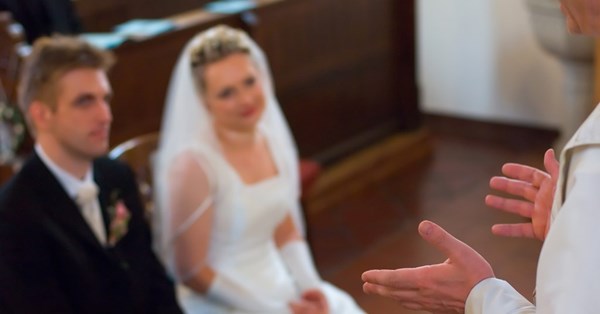THE Bishop of Islington, the Rt Revd Ric Thorpe, has published what is described as “a relatively short theological summary of the doctrine of marriage as the Church of England has received it” ahead of the General Synod debate on the bishops’ proposals for the blessing of same-sex unions.
The nine-page document is signed by 14 bishops, nine of whom are diocesans, from both Catholic and Evangelical traditions. The signatories are the Bishops of Coventry, Rochester, Hereford, Leicester, Carlisle, Chichester, Guildford, Sheffield, and Southwell & Nottingham, as well as the Bishops of Fulham, Horsham, Woolwich, Lancaster, and Islington.
In a post on Twitter on Tuesday, linked to the document, Bishop Thorpe said that he hoped the document could be “a resource to the C of E in its ongoing discussions”.
The introduction suggests the document is a response to a request for guidance “in understanding why many Christians in the Church of England and the Anglican Communion, together with Christians from across the churches of world Christianity, continue to believe that marriage is given by God for the union of a man and woman and that it cannot be extended to those who are of the same sex”.
They write: “This paper emerged from study and conversations in recent months among a number of bishops, Evangelical and Catholic. It was helpful not only to us but also to other bishops of the same mind, in clarifying some of our own thinking and prayerful discernment on these important matters as we contributed to the LLF deliberations in the College of Bishops.”
They continue: “Without seeking to diminish the value of many committed same-sex relationships, for which there is much to give thanks, we find ourselves constrained by what we sincerely believe the scriptures teach which cannot be set aside.”
The bishops recognise that their paper will not be welcomed by all, but stress: “In offering this paper we are committed to continue to listen and learn from those with whom we disagree.”
The document starts from the Preface to the Book of Common Prayer, which accords marriage a sacramental significance. The BCP describes the goods of Christian marriage in Anglican teaching as threefold: for the procreation of children, as a remedy against sin; and for mutual society. Common Worship re-orders these as for companionship, the gift of sex, and the bearing of children.
“There are, of course, significant overlaps between a secular and Christian understanding of marriage . . . and some would argue that the similarities outweigh the distinctives. However the two understandings rest on very different foundations,” the bishops write.
“Christians see the world differently, believing that Creation, while fallen, still retains a sense of order and structure, a ‘givenness’ in every sense of the word. Christians have generally understood the male-female relationship not as incidental, but as part of a vast interconnected metaphysics — a world where humanity is deeply rooted in and connected to God, to the rhythms of the natural created order, a measureless system both visible and invisible, and yet profoundly real. In this scheme, biological difference is not accidental but deliberate and good.”
It is for this reason, they conclude, that marriage between a man and a woman has met the classic criteria of doctrine up until the most recent times.
Christian marriage, they continue, is “more than a contract, a private arrangement between two individuals that helps build social cohesion. It is theologically much more significant.” Every time a man and woman are joined together in the promise of lifelong fidelity, the goodness of creation is affirmed, the interdependence of humanity is celebrated, the story of salvation is depicted, and life is (potentially) generated. “Marriage is thus a sacramental sign of something bigger than itself and that signification depends to a significant degree on sexual difference. Every marriage is thus a proclamation of the gospel.”
The paper goes on to explore relevant biblical themes. Scripture as is about creation and new creation from beginning to end, the bishops write. “From Genesis to Revelation, and in the proclamation of Jesus, the biblical story is about the coming together of heaven and earth . . . of the true God and his bride. The marriage of a man and a woman symbolises and proclaims this story.”
Marriage is embedded in the Church of England’s doctrine of the Church, they write. “Candidates for ordination as priests are told that ‘The Church and Congregation whom you serve, is his spouse and his body.’
“Any change to the doctrine of marriage as a union between a man and a woman would therefore not only unravel the scriptural story of salvation, but risk undermining our understanding of the nature of the Church as it is derived from scripture and given to us as a revelatory sign. Marriage is essentially an ecclesial, as well as a human, instrument of unity.”
The bishops conclude that same-sex relationship can be “lifelong, loving, committed, faithful, and provide deep and enduring companionship”, and that the Church needs to “recognise and welcome such relationships, without explicitly or implicitly changing her teaching by doing so”.
And they repeat the familiar call for repentance for homophobia. “There is still work to be done on how the Church can best provide a better welcome and radical inclusion for LGBTQI+ Christians and others, and to find appropriate ways to affirm the goods of same-sex relationships.
“Yet the theological framework outlined above explains why, for many, a move towards same-sex marriage in church is not the way to do this, and why the witness of Holy Matrimony to the gospel in the ways outlined above needs to be preserved.”
Credit: Source link




